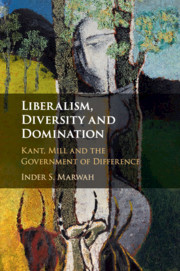Description
Liberalism, Diversity and Domination
Kant, Mill and the Government of Difference
Author: Marwah Inder S.
Examines how distinctive liberalisms respond to racial, cultural, gender-based and class-based forms of diversity and difference.
Language: English
Subject for Liberalism, Diversity and Domination:
Approximative price 31.58 €
In Print (Delivery period: 14 days).
Add to cart
Liberalism, Diversity and Domination
Publication date: 12-2020
Support: Print on demand
Publication date: 12-2020
Support: Print on demand
Approximative price 107.81 €
In Print (Delivery period: 14 days).
Add to cart
Liberalism, Diversity and Domination
Publication date: 05-2019
306 p. · 15.5x23.4 cm · Hardback
Publication date: 05-2019
306 p. · 15.5x23.4 cm · Hardback
Description
/li>Contents
/li>Biography
/li>
This study addresses the complex and often fractious relationship between liberal political theory and difference by examining how distinctive liberalisms respond to human diversity. Drawing on published and unpublished writings, private correspondence and lecture notes, the study offers comprehensive reconstructions of Immanuel Kant's and John Stuart Mill's treatment of racial, cultural, gender-based and class-based difference to understand how two leading figures reacted to pluralism, and what contemporary readers might draw from them. The book mounts a qualified defence of Millian liberalism against Kantianism's predominance in contemporary liberal political philosophy, and resists liberalism's implicit association with imperialist domination by showing different divergent responses to diversity. Here are two distinctive liberal visions of moral and political life.
1. Introduction; 2. Unbending crooked timber; 3. Difference, diversity and exclusion; 4. Democratic character and the affective grounds of politics; 5. Complicating barbarism and civilization; 6. Millian liberalism; 7. Epilogue.
Inder S. Marwah is an Assistant Professor of Political Science at McMaster University, Ontario. He has published articles in political theory in leading peer-reviewed journals. His research focuses on the intersection of race, empire, and political theory, both in the history of political thought and in the present.
© 2024 LAVOISIER S.A.S.
These books may interest you

LiberalismThe Basics 25.19 €



